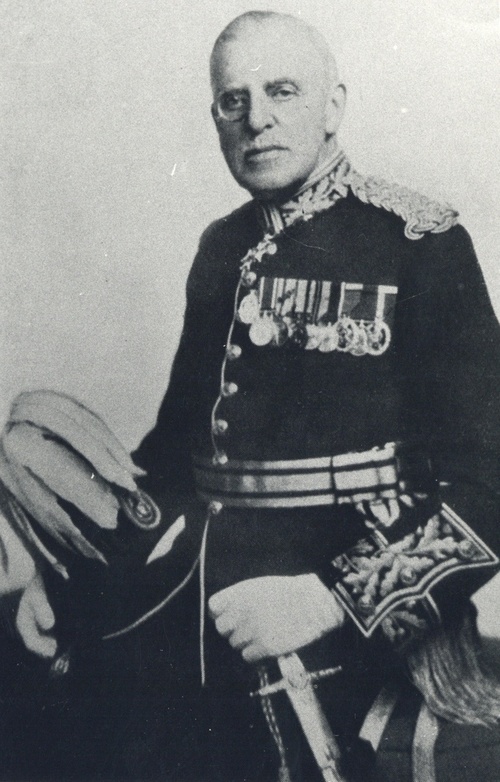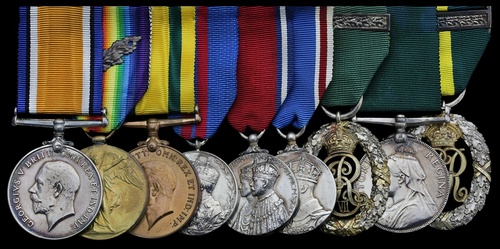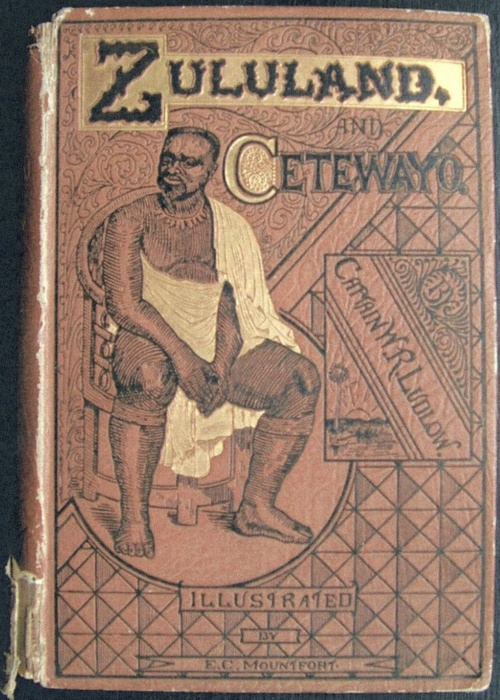Auction: 20001 - Orders, Decorations and Medals - conducted behind closed doors
Lot: 884
An exceptional Terrier CO's group of nine awarded to Brigadier-General Sir W. R. Ludlow, K.C.B., C.B., Royal Warwickshire Regiment
Explorer and author of the famous work Zululand and Cetawayo which charted his travels and gave a fine account of the Zulu wars, Ludlow was a fine officer who 'held with almost passionate fervour it to be the duty of every man to give military service'
He set himself the job of raising a new Battalion for the Royal Warwickshire Regiment - he commanded it on the Western Front aged 61 and received his richly-deserved K.C.B. from King Edward VIII in 1936
British War and Victory Medals with M.I.D. oakleaves (Brig. Gen. W. R. Ludlow.); Territorial Force War Medal 1914-19 (Col. W. R. Ludlow. C.B.); Coronation 1911; Jubilee 1935; Coronation 1937; Volunteer Officer's Decoration, E.VII.R., unnamed as issued, hallmarks for 1907, with top bar riband; Volunteer Force Long Service Medal, V.R. (Major W. R. Ludlow. 1894.); Territorial Decoration, G.V.R., unnamed as issued, hallmarks for 1919, with top riband bar, mounted for wear, lacquered, very fine (9)
[K.C.B.] London Gazette 23 June 1936.
[C.B.] (Civil Division) London Gazette 19 June 1911.
[C.B.] (Military Division) London Gazette 1 January 1918.
Walter Robert Ludlow was born on 18 July 1857 at Erdington, the eldest son of Joseph Ludlow, Company Director, of Sutton Lodge, Solihull, Warwickshire. Educated at Solihull Grammar School and a boarder in the Reverend C. McDowall's House, Malvern College, from 1870-73, Ludlow spent the next four years travelling across the globe, often with his father in tow. In 1871 the pair travelled to Paris and found themselves passing through the Prussian lines as they attempted to reach the City. Two years later, the young man travelled 1000 miles on horse-back through Uruguay, and in 1879 took a 14ft. canoe down the River Thames, crossing to Calais from Ramsgate; the adventure took him thirty hours. A year later, Ludlow travelled through Zululand and Togoland, and he wrote a book about his travels titled Zululand and Cetawayo which was successfully published in 1882 by Messrs. Simpkin, Marshall & Co., of Birmingham. Well received, it contained an enlightening account of Zulu customs, manner and habits, at a time when tensions remained high following the events of Isandlwana and Rorke's Drift, and the heavy defeat inflicted upon the Zulus at Gingindlovu, where more than 1000 warriors were killed by a British column under Lord Chelmsford, G.C.B., G.C.V.O.
In 1887, Ludlow succeeded to his father's business. He became a Senior Partner in the firm of Ludlow, Briscoe and Hughes of Birmingham, which specialised in auctioneering, surveying and valuations. In 1895 he was appointed Surveyor to the Board of Trade (Railway Department) and in 1890 Ludlow became a Fellow of the Surveyor's Institution. He was also a devoted Unionist, though 'his ambitions never quite carried him into the firing line of politics.' (The Birmingham Post, 15 October 1941, refers)
"Father" of the Birmingham Terriers
Ludlow enlisted into the corps his father had helped to establish, becoming a 'Citizen Soldier' of the 1st (Birmingham) Corps, Warwickshire Rifle Volunteers, at Bingley Hall in 1874. Granted a commission as Supernumerary Sub-Lieutenant, he was promoted Lieutenant on 1 December 1876, Captain on 4 March 1882 and Major on 1 April 1891. He was also appointed Honorary Secretary of the Midland Volunteer Officers' Association for two years from its formation in February 1887. In 1895 he was presented the Volunteer Long Service Medal, the medal being awarded by Major-General J. H. Hall, commanding the North-Western District.
Promoted Lieutenant-Colonel on 12 October 1901, he was awarded the Volunteer Officers' Decoration on 23 September 1904 and granted the honorary rank of Colonel on 22 November 1906. On the formation of the Territorial Force in 1908, Ludlow was appointed to the Command of the newly created 8th Battalion, the Royal Warwickshire Regiment; headquartered at Aston Manor, Witton, Birmingham, its inception was largely due to his ability to raise and recruit. Appointed C.B. (Civil Division) in 1911, Ludlow transferred to the T.F. Reserve of his Battalion as Lieutenant-Colonel on 17 May 1913, becoming a co-opted Member of the Warwickshire T.F. Association. He also became Colonel-Commandant of Cadets for the County of Warwickshire, and remained such until 1926.
The Great War
Recalled to serve at the outbreak of the hostilities, Ludlow became Chief Recruiting Officer in Birmingham at the age of 57. He was thus heavily involved in raising the three infantry battalions of the Royal Warwickshire Regiment in September 1914, affectionately known as the 'Birmingham Pals'. Appointed Brigade Commander on 9 January 1915, Ludlow was promoted temporary Colonel from the same date, being placed in Command of the 184th Infantry Brigade for a little over a year until 22 February 1916. The Brigade remained in England during this period and formed part of the 61st (2nd South Midland) Division.
Granted the honorary rank of Brigadier-General on relinquishing command, on 16 May 1917 he was graded Staff Lieutenant 1st Class and posted to France. He became an Area Commandant in Ypres, Flanders, and held this appointment during 1917-18. His diary - which was compiled during his time at Ypres - was gifted to the Imperial War Museum in 1975. The Ludlow family were not left unscathed by the war; his younger son, Captain Stratford Walter Ludlow, was killed in action on the first day of the Battle of the Somme whilst serving with 'C' Company, 1/8th Battalion, Royal Warwickshire Regiment.
Appointed C.B. (Military) in 1918 Ludlow was also mentioned in despatches for 'valuable services rendered in connection with the War to 31 December 1917' (London Gazette 12 February 1918, refers). He was awarded the T.D. in 1920 (London Gazette 14 January 1920, refers), and was appointed Honorary Colonel of the 8th Battalion, Royal Warwickshire Regiment, on 12 August 1922, being made K.C.B. in 1936. The Birmingham Daily Gazette, 15 July 1936, refers:
'His three daughters surround him and kissed him affectionately, while the waiting crown looked on at the happy family incident. About 200 men and women received the insignia of decorations and honours conferred on them in the recent Birthday Honours List. It was the first Investiture at which King Edward has given honours conferred by himself.'
Further exploits
Having married Helen Florence in 1883, the third daughter of Charles Hart of Harborne Hall, Staffordshire, Ludlow devoted his time helping to raise four daughters and two sons. He was made J.P. for the City of Birmingham in 1892 and for the County of Warwickshire in 1923, and served as D.L. for Warwickshire from 1921. Ever a keen sportsman, he enjoyed riding to hounds, shooting, fishing and boating. With his friend Lord Leigh - a former President of the Warwickshire T.A. and Air Force Association - he spent a week each year fishing for pike:
'During four expeditions in Devonshire, I which I accompanied him (Lord Leigh), we bagged 313 fish, with a total weight of 3,236lbs.' (The Coventry Evening Telegraph, refers)
In the autumn of 1940, Ludlow was often in the field with the Springfield Beagles, and occasionally - even after he had reached "the eighties" - he went otter hunting. (The Birmingham Post, 15 October 1941, refers)
The Brigadier-General died at Lovelace Hall on 14 October 1941 aged 84 years. His funeral took place on 18 October at Solihull Parish Church, followed by interment in the family grave at Knowle Parish Churchyard. His wife predeceased him by a year; sold with copied MIC, extensive research including entries from Who's Who and numerous contemporary newspaper articles.
Subject to 20% VAT on Buyer’s Premium. For more information please view Terms and Conditions for Buyers.
Sold for
£2,700
Starting price
£800









